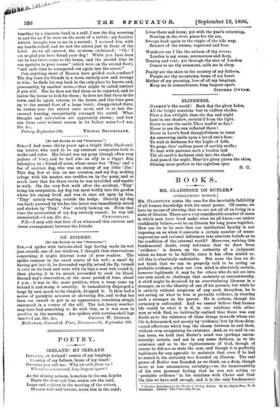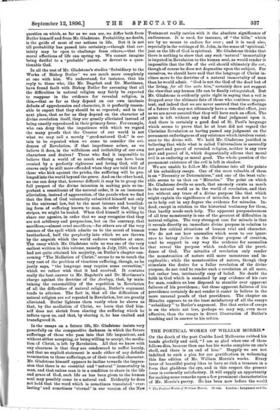BOOKS.
MR. GLADSTONE ON BUTLER.* CONCLUDING NOTICE.
MR. MR. GLADSTONE states the case for the inevitable fallibility► of all human knowledge with his usual power. Of course, we have no means of showing that we are not all of us living in a, state of illusion. There are a very considerable number of cases in which men have lived under what we all know,—or rather confidently believe,—to be an illusion for long years together. How are we to be sure that our intellectual faculty is not imposing on us when it converts a certain number of sense- impressions and rational inferences into absolute beliefs as to- the condition of the external world? Moreover, waiving this fundamental doubt, every inference that we draw from `evidence' is drawn on the authority of a judgment which we know to be fallible, since it has often misled us_ All this is absolutely undeniable. But none the less we do not think that we can be properly said to be acting on probable evidence, when our own mind is absolutely certain, however legitimate it may be for others who do not see into, our own mind, to challenge that certainty as untrustworthy. A child might be deceived by an overwhelming likeness in a stranger, as to the identity of one of his parents, but while he- is entirely without suspicion of any such deception, he is not acting on what to him is probable evidence, in treating such a stranger as his parent. He is certain, though his certainty is unfounded. And we cannot believe that human life would be what it is if, in our relations with either men or with God, we habitually realised that there was any doubt as to the existence of those beings towards whom our life is determined, not merely by' evidence,' but by those deep- rooted affections which leap the chasm between us and them, without even recognising its existence. And, as we said in our last issue, we hold that Butler's mind was (perhaps uncon- sciously) certain, and not in any sense dubious, as to the existence and as to the righteousness of God, though of course he did not so state the case, and though it is perfectly legitimate for any agnostic to maintain that even if he had so stated it, his certainty was founded on illusion. The real power of Butler was founded, as we think, on a deep, though more or less unconscious, certainty,—on the immoveability of his own personal feeling that he was not acting on ' probable evidence' in his relations with Christ and God. On this we have said enough, and it is the only fundamental • Studies Subsidiary to the Works of Bishop Butler. By the Right Hon. W. E. Gladstone. Oxford: The C'aresdon Prw.
question on which, so far as we can see, we differ both from Butler himself and from Mr. Gladstone. Probability, no doubt, is the guide of most of our actions in life. But it is not till probability has passed into certainty,—though that cer- tainty may be open to challenge from others,—that the moral affections of life can spring up. We cannot imagine being dutiful to a probable' parent, or devout to a ques- tionable God.
In all the rest of Mr. Gladstone's studies Subsidiary to the Works of Bishop Butler' we are much more completely at one with him. We understand, for instance, that his reply to those who, like Mr. Bagehot and Dr. Martineau, have found fault with Bishop Butler for assuming that all the difficulties in natural religion may fairly be expected to reappear in the evidence for revealed religion, is this,—that so far as they depend on our own intrinsic defects of apprehension and character, it is perfectly reason- able to expect that they should be so repeated ; and in the next place, that so far as they depend on the character of divine revelation itself, they are greatly alleviated instead of being exactly reproduced in their primary force. For example, who can deny that the impatience with which we regard the many proofs that the Creator of our world is not what we may call a merely " good-natured God," is cer- tain to be repeated when we come to consider the evi- dences of Revelation, if that impatience arises, as we believe it does, in the wilfulness and irritability of our own characters and desires ? Those who find it impossible to believe that a world of so much suffering can have been created by a perfectly righteous and loving God, will of course only be still more offended when they are told that for those who kick against the pricks, the suffering will be pro- longed into the world beyond the grave. And on the other hand, no one can deny that, however difficult it may be to grasp the full purport of the divine intention in making pain so im- portant a constituent of the natural order, it is an immense alleviation, instead of aggravation, of the puzzle when we find that the Son of God voluntarily submitted himself not only to the universal law, but to the most intense and humiliat- ing form of suffering known to man, in order that, by his stripes, we might be healed. When God himself is willing to share our agonies, in order that we may recognise that they are not arbitrary and purposeless, but on the contrary, that sacrifices,—almost cruel sacrifices,—for others are of the very essence of the spell which admits us to the secret of human brotherhood, half the perplexity into which we are thrown by the anguish which the world endures vanishes at once. The essay which Mr. Gladstone tells us was one of the very earliest written in this volume, namely, in July, 1830, when he had not quite attained his majority, on Butler's chapter con- cerning "The Mediation of Christ," seems to us to touch the very root of the problem of vicarious suffering, though, as he justly says, "the language may require some correction," which we rather wish that it had received. It contains really the best answer to Mr. Bagehot's and Dr. Martineau's charge against the doctrine of the Analogy, that, by main- taining the reasonability of the repetition in Revelation of all the difficulties of natural religion, Butler's argument tends to atheism. The fact is, that all the difficulties of natural religion are not repeated in Revelation, but are greatly alleviated. Butler lightens them vastly when he shows us that, by the mediation of Christ, we learn that God him- self does not shrink from sharing the suffering which he inflicts upon us, and that, by sharing it, he has exalted and transfigured it.
In the essays on a future life, Mr. Gladstone insists very powerfully on the comparative darkness in which the future sufferings of those who pass into that life impenitent, and without either accepting, or being willing to accept, the media- tion of Christ, is left by Revelation. All that we know with any clearness is that they are condemned to suffer keenly, and that no explicit statement is made either of any definite termination to those sufferings, or of their remedial character. Mr. Gladstone himself appears to incline towards the impres- sion that there is no essential and " natural " immortality in man, and that unless man is in a condition to share in the life and grace of God, such life as has been given to the human soul may possibly come to a natural end. Evidently be does not hold that the word which is sometimes translated ever- lasting' and sometimes eternal' in our version of the New
Testament really carries with it the absolute significance of endlessness. It is used, for instance, of " the hills," which are by no means to endure for ever ; and it is used also, especially in the writings of St. John, in the sense of ' spiritual,' just as the life of God is spiritual. Mr. Gladstone thinks that there is nothing to show that any such natural' immortality is imputed in Revelation to the human soul, as would render it impossible that the life of the evil should ultimately die out, though of course he does not dogmatise upon the subject. For ourselves, we should have said that the language of Christ in- clines more to the doctrine of a natural immortality of man than he would admit. " God is not the God of the dead but of the living, for all live unto him," certainly does not suggest. the view that any human life can be finally extinguished. Bub Mr. Gladstone is evidently quite right in saying that a veil is dropped over the ultimate fate of those who continue impeni- tent, and indeed that we are never assured that the sufferings of a future life may not ultimately have a remedial effect, just as we are never assured that they will have such an effect. The point is left without any kind of final judgment upon it. And there is certainly a good deal of St. Paul's language which seems to prove that he at least did not regard the Christian Revelation as having passed any judgment on the permanent enduringness of any existence which involves resist- ance to the divine will. We hold Mr. Gladstone justified in believing that while what is called Universalism is assuredly not part and parcel of revealed religion, neither is any view part and parcel of it, which dogmatically affirms that moral evil is as enduring as moral good. The whole question of the permanent existence of the evil is left in shadow.
We are unable to follow Mr. Gladstone into all the points of his subsidiary essays. One of the most valuable of them is on " Necessity or Determinism," and one of the least valu- able seems to us that on " Miracles." The point on which Mr. Gladstone dwells so much, that anomaly exists as much in the natural world as in the world of revelation, and that too without any trace of a divine purpose like that which might explain the significance of miracles, does not seem to us to help out in any degree the evidence for miracles. In- deed, except in relation to the historical testimony for them, that hardly needs such help. The apparent purposelessness of all true monstrosity is one of the greatest of difficulties in natural religion. The very strongest case for miracle is that it reveals directly an immediate divine purpose in relation to some few critical situations of human trial and character. We do not see how anomalies which seem to our ignor- ance to betray failure in the divine purpose of creation, tend to support in any way the evidence for anomalies that reveal the purpose which underlies all the provi- dence of God. The miracles of revelation only render the monstrosities of nature still more monstrous and in- explicable ; while the monstrosities of nature, though they stimulate the desire for a fuller revelation of the divine purpose, do not tend to render such a revelation at all more, but rather less, intrinsically easy of belief. No doubt the faith in God which is sustained by any evidence of his care for man, renders us less disposed to stumble over apparent failures of his providence ; but those apparent failures of his providence certainly do not render it easier to believe in the more unusual proofs of that providence. The chapter on Miracles appears to us the least satisfactory of all the essays. "subsidiary" to Butler's argument. But that series of essays is on the whole not less, perhaps we may say, even more effective, than the essays in direct illustration of Butler's teaching and in answer to his critics.



































 Previous page
Previous page